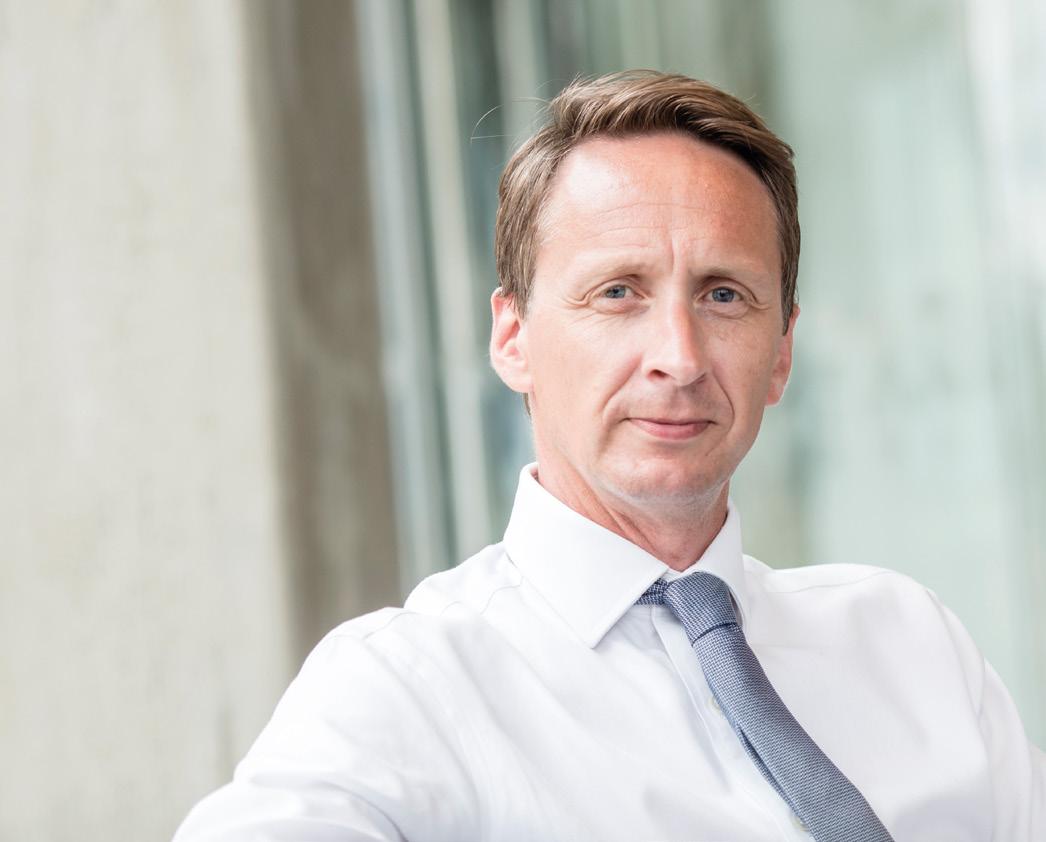OUR JOURNEY





The Right Honourable the Lord Lingfield
Her Excellency, Princess Victoria Adejoke Orelope-Adefulire

Keith Ramsay, ABE Chair
Rob May, ABE CEO
ABE – Making a difference for 50 years

Foreword The Right Honourable the Lord Lingfield, Kt EdD DLitt LLD DL
This year ABE celebrates the five decades since its foundation of a highly successful education service which is engaged in many parts of the world. It has proved that, in these times of change, one thing remains reassuringly constant, and that is the allure of British education. This country’s qualifications, its vocational education institutions and its universities remain very attractive on the global stage due to their relentless focus on standards and on ground-breaking research.
The UK’s high-quality education sector is one of the most important factors contributing to the country’s prestige and ‘soft power’. There is a conventional assumption that international students, as a result of their positive educational and cultural experiences here, will identify more closely with the UK, forming a cultural diaspora, and as they reach positions of influence in their home countries, will be inclined to favour British interests. Today, however, that image is being rightly transformed through an emerging shift in
values. ABE’s education offer, whether in this country or abroad is distinctly inclusive, striving to accommodate diversity of thought and experience through its high-quality development of a curriculum that takes responsible care to blend British-led research with international inquiry and practice.
British institutions are leading the western world in reshaping the tertiary and higher education landscape, through the internationalisation of education. The task of creating a learning experience which represents universal knowledge and also respects local intellectual traditions and skills needs will be a necessary one for transnational education over the decade ahead and is of vital importance for building trust and achieving long-term global goals.

In the commercial world, translatable skills are essential for creating a space where professionals can be relied upon to conduct business in predictable, similar ways. Settling on a model of international standards to achieve this does not have to mean cultural convergence, rather management skills can be advanced as a technical facility available and understandable to all, to make international trade all the more frictionless amidst a mosaic of cultural differences.
ABE has made its practice to seek out equitable global partnerships and has focused on building human and institutional capacities which reflect not only the experience of learning and working in London or New York, but also in Accra, Dubai, Kuala Lumpur, or New Delhi. I am encouraged also that alongside the development of technical business skills, ABE has promoted an international code of business ethics. Whilst most multinational firms have basic policies on employee integrity, there is relatively little educational space as yet dedicated to ethical guidelines in a global context concerning bribery, exploitive child labour, human rights violations and other issues that graduates may encounter in the global marketplace.
ABE deserves every congratulation on sustaining a global-local approach, on developing a modern and relevant curriculum, and on achieving half a century of success in the export of high quality education.

“ABE’s education offer, whether in this country or abroad is distinctly inclusive, striving to accommodate diversity of thought and experience.”
Foreword
Her Excellency, Princess Victoria Adejoke Orelope-Adefulire, Senior Special Assistant to the President on Sustainable Development Goals, Nigeria
The 2030 Agenda for Sustainable Development recognises that we must make quality education available to all, to achieve a prosperous and peaceful world. These targets specifically include the elimination of gender disparities, ensuring equal access and affordability, and are inclusive of youth, adults, persons living with disabilities, men and women, across developing and developed countries.
Across the world today, substantial barriers are limiting both the youth and adults from gaining new skills which will enable them to compete in a rapidly evolving world. Through the development of an open and flexible learning environment we may be able to help vulnerable people circumvent issues such as proximity to learning resources, poverty, the effects of conflict, poor infrastructure and more, which hinder them from learning. The future of education will no doubt rely largely on the use of digital tools and technology to provide relevant knowledge and skills for all.
Due to the disruption of education by Covid-19, especially as it affected students in OECD countries, I am aware that ABE took defining steps, by adapting to open book exams and switching to remote learning – the first UK awarding body to do so. This helped to provide thousands of young people with the opportunity to continue with their education unabated.
In developing countries, we witnessed the unprecedented effects of interrupted education due to school closures amid mandatory lockdowns. Girls were disproportionately impacted by this, as a good number failed to return to school alongside increases in the reportage of violence and abuse, unplanned pregnancies and child marriages.

More than ever, this reveals the need to build resilience and inclusion into our education systems to ensure that we bridge education and skills gaps as we strive to leave no one behind.
By partnering with the United Nations Educational, Scientific and Cultural Organisation (UNESCO) Read and Earn Federation, ABE is contributing immensely to the promotion of education in Nigeria. Programmed to run for ten years, the digital entrepreneurial skills course aims to reach around 120,000 Nigerian youths each year. Digital tools are thus helping to promote collaboration, create access to a greater variety of resources, tailor the learning experience, and overall transform the future of education.

Young girls of middle and high-school age, who are at risk of dropping out of school are also being supported through scholarships and grants to help them kick-start their own businesses. Upon graduation, they will go on to contribute positively to their communities and various development landscapes.
At the heart of ABE’s work is a drive to provide inclusive, high-quality business education and skills, to produce entrepreneurs who can compete globally and transform their local communities. As ABE commemorates their fiftieth anniversary, this Special Edition highlights a long and distinguished history of bridging skills gaps, especially for those who are furthest behind.
“At the heart of ABE’s work is a drive to provide inclusive, high-quality business education and skills...”Foreword Keith Ramsay, Chair of the Board, ABE Global


When Lyndon Jones set up ABE in south west London in February 1973, little did anyone know how the world of education and skills would change over the next half a century. We have moved from a world at that time where the computer’s involvement in education was minimal to an age where technology and technological solutions are the default position for almost every decision we take and the latest versions seem to be required to access information, data and knowledge.
What hasn’t changed however is that the values and vision that lie at the heart of ABE are still as relevant today as they were half a century ago- “accessible education, affordable for all”. The most important thing is that ABE is still here, still based in south west London and still as relevant today as it was five decades ago.
There are too many people – teachers, influencers and students themselves –involved in the growth and development of ABE to name them individually but
on behalf of the current Board of ABE, I want to express our thanks for all of their contributions to the success of this organisation, its role in our operating countries and beyond, its continuing innovation and its growing reputation as more than just an awarding organisation but as a thought leader within the sector.
Happy birthday ABE –and here’s to the next 50 years!


Foreword
Rob May, CEO at ABE Global
ABE is guided by a simple idea. We believe that the world is a better place when everyone has access to economic opportunity. This includes people starting their career and professionals seeking to expand their horizons and boost their earning power.
Since 1973, we have helped thousands of people to build a productive and prosperous life as an entrepreneur or executive, through the power of education. From the beginning, our outlook has been truly international. We ran our first exams in London, Hong Kong, and Singapore, and from there have grown into a leader in international business education. To date, over 3 million ABE exams have been sat.
ABE never sleeps, we have expanded our operations across four continents with a global team working across different time zones, and who are always ready to support our students and centres. We have always channelled most of our efforts towards low-and-middle income countries, where self-belief and ambition is often at its lowest, and where access to high quality international education is prohibitively
expensive. It has been our mission to empower people everywhere to believe in their potential, by making business skills and meaningful credentials more widely available. Most of the countries we entered decades ago are now achieving greater global economic relevance, and despite recent setbacks, they are rebounding towards a durable recovery based on corporate sector growth. I’m proud to reflect that ABE may have played a small part in this journey. Whilst academic achievement can be measured in a moment, the impact of the ABE experience is deep and lasting. Over time, ABE graduates have added significant value to their local communities and economies.
Our efforts to make the world a better place do not stop at offering professional qualifications. Just as the future of education and economic activity is being re-shaped, ABE is consistently re-imagining the scope of our learning offer. We provide a widening range of education solutions designed to ignite a lifelong journey of curiosity and learning from the school room to the board room.
We also want our students to broaden how they perceive the world around them. That’s why we launched the ABE Way manifesto to inspire a community of practice and progress, where learners commit to positive social change and can turn risk and fear into opportunity and security, by changing the way they think, feel, and act. The serious challenges in the world today remind us that these abilities are needed now more than ever.
As we reflect on ABE’s remarkable heritage, it is right to also celebrate our partnerships. ABE would not be here without the hundreds of delivery partners and accredited ABE centres which have shared our vision and commitment. To our loyal supporters we owe a debt of gratitude. It has been an honour to serve and lead ABE through a remarkable journey to rediscover the pioneering spirit which makes us unique amongst British awarding organisations. The challenge before us now is to embrace innovative ways of building economic capacity in our host countries and in the UK, so that we
may continue to provide skills and agency to thousands more young people over the next 50 years.
“It has been an honour to serve and lead ABE through a remarkable journey to rediscover the pioneering spirit which makes us unique amongst British awarding organisations.”














